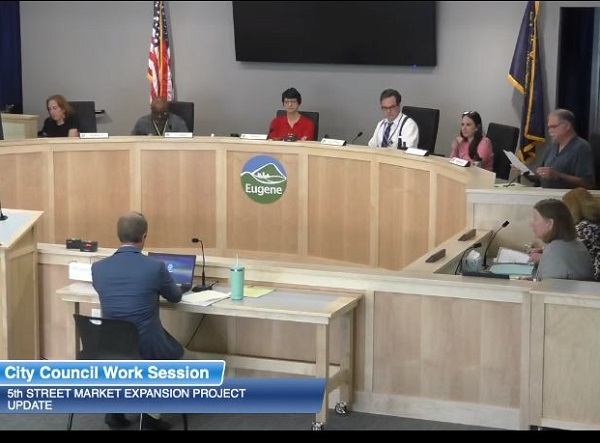Obie plans 7-story development in 5th Street Market district
6 min read
Community Development Director Will Dowdy: You can call that trickle-down
Will the new seven-story Obie project on 5th take out MECCA’s historic building? At the July 18 Council work session, from the City’s Planning and Development Department, Will Dowdy.
[00:00:11] Will Dowdy: My name is Will Dowdy. I’m the community development director.
[00:00:14] Four years ago—we were sitting in a different building at the time—I was sharing an update on a big expansion proposed by Obie Companies for the 5th Street Market. A couple years later, the Gordon Lofts moved in and the businesses and hotel on The Market Alley opened their doors. Today, I want to give you an update on new plans for the Market District.
[00:00:31] As you know, the 5th Street Market District is a mixed-use district on the east end of 5th Avenue between Willamette Street and the train station and to the east, the downtown riverfront. If you’ve walked through here, you’re well aware of two surface parking lots on the south side of 5th up against the recent development and on the north side of the street next to the Oregon Electric Station. These two locations were called out in that plan as two downtown development opportunity areas.
[00:00:54] Obie Companies is proposing to build approximately 325 new housing units with street-level commercial on these sites that would fill a key gap in the walking experience of 5th Avenue. The buildings are proposed as seven-story buildings, including structured parking for both residents and others. The first of these buildings is next to the Oregon Electric Station with the following phase called The Mildred standing next to the Gordon Lofts & Hotel.
[00:01:17] John Q: He said this project alone will make significant progress toward the city’s housing goals.
[00:01:23] Will Dowdy: The Housing Implementation Pipeline has five-year goals that include issuing permits for the construction of 6,000 housing units citywide and increasing the amount of housing units downtown by 50%. The proposed Market District expansion projects would account for 5% and 25%, respectively, towards those two goals.
[00:01:41] Councilor Emily Semple: Thank you. This is a pretty exciting stuff. I have a constituent who’s very worried about the baggage building, where MECCA is moving from, historic building. Is that protected or is that possibly going to be removed?
[00:01:56] Will Dowdy: There’s two important historical buildings. There’s that building and the Oregon Electric Station and Obie Companies has said that they’re aware of the value that they have to the community and have no intention to disturb either of those.
[00:02:08] Councilor Randy Groves: Three hundred and twenty-five new units of housing, that’s huge. I mean, we’re trying to densify, we are trying to provide more housing when we have a dearth of housing in this community now, we’re trying to bring people downtown. One of the ways that we help address behavioral problems is populating our streets with people, and it really does have an effect. I’m excited about the potential here.
[00:02:36] Councilor Matt Keating: I’m just going to editorialize aesthetically for a moment before I underscore my enthusiasm for building up and not out. You drive by where the Gordon Lofts Hotel are, the new Nike building goes right up to the street, really boxes things in, and just aesthetically, going right up to that sidewalk, it’s really unattractive. I’ve heard that opinion expressed multiple times. I suspect that I’m not alone on council, sharing such opinion. (Wondering where Buffalo Exchange, one of my favorite places to shop, would end up in that.)
[00:03:05] John Q: He noted that the multi-unit property tax exemption (MUPTE) would again be used for market-rate housing.
[00:03:13] Councilor Matt Keating: I think that it’s prudent for this council to revisit MUPTE, are we getting really the bang for the buck—if there’s a MUPTE and a contractor or a builder doesn’t have to have truly a scaled or mixed economy, truly have affordable housing, instead those dollars go into an affordable housing pool of money—are we really, truly getting our bang for the buck? I think it’s high time, Council President, that we revisit our MUPTE parameters.
[00:03:41] John Q: He repeated his intent later in the meeting.
[00:03:44] Councilor Matt Keating: An adjustment to MUPTE that increases the investment in low-income or affordable housing or our affordable housing fund— not striking entirely a tool that has clearly been beneficial in regards to building housing.
[00:04:01] Councilor Mike Clark: Envision Eugene was all about the question: is Eugene going to grow out or is it going to grow up? And we answered that question, as near as I understand it, that we’re going to focus on what’s needed so that we get more housing downtown and we grow up.
[00:04:16] I’m excited about the opportunities for this project. I think it fulfills a number of longstanding plans this council has made over the years and I think it’s time we recognize that growing up in our downtown, as we’ve long planned to do now, requires us to ease up on our height limitations in order to get it done and afford to do it.
[00:04:37] John Q: He took note of two Southern California schools leaving the PAC-12 for the Big Ten.
[00:04:43] Councilor Mike Clark: Councilor Evans brought up something in a conversation with me the other day, that if the University (of Oregon) succeeds in some manner of conference change, there are other conferences with student populations in the 50,000 range, not the 23,000 range. And I suspect that if our conference for the University of Oregon changes, that’s going to have a significant effect on housing in our community. That’s probably an understatement.
[00:05:12] Councilor Alan Zelenka: I hope that they preserve the OES and the train station building. Those are very cool buildings. I worked at the Oregon Electric Station when I first moved here…
[00:05:19] I don’t really like MUPTE. And one of the things that I did strongly work towards is getting that option to have that affordable housing trust fund of 10% of the MUPTE going to affordable housing. That’s how we got the $500K or so for The Montgomery project that made that feasible. And that for me provided the adequate public benefit that we needed to get out of these projects, but I still don’t necessarily like MUPTE as a tool, but I wanted it to create more public benefit.
[00:05:51] Councilor Randy Groves: Will, do you agree that any housing at any level helps our housing shortage and is there a trickle-down effect that takes place?
[00:05:59] Will Dowdy: That feels a little bit like a trick question? Yes. Any housing that is built does help our housing shortage, kind of by definition. And I don’t have any good statistics on it, but I do know that we have seen investments of housing of one type influence housing of another, so you can call that a trickle-down, but yes, there’s need across the entire spectrum. And so what happens is that people of one category, whether it’s an income-based or price- based, or household size or students vs. non-students, the shortage is acute pretty much consistently across the spectrum. And so you will have people reaching from one pool into a housing type that impacts other people.
[00:06:36] Councilor Randy Groves: Got it. Thank you. And I wasn’t trying to trick you, excuse my clumsiness in my questioning.
[00:06:41] John Q: With the final word, Councilor Keating.
[00:06:44] Councilor Matt Keating: I want to recognize that there’s a plethora of student housing in this community, not a dearth of student housing. There’s a dearth of housing. There’s a plethora of student housing.
[00:06:55] I would welcome a conversation, a work session, whatever you want to call it, on underscoring the need for far more flexibility with so-called student housing, asking the question: Why isn’t it community housing, seniors and students and residents of all ages living in a community or a shared community rather than simply so-called student housing?
[00:07:21] John Q: Will Dowdy updates the council on the latest from the Obie Companies. The council will be asked to approve a zoning change to C2, a MUPTE tax exemption, and a modified height limit for the proposed seven-story project.





